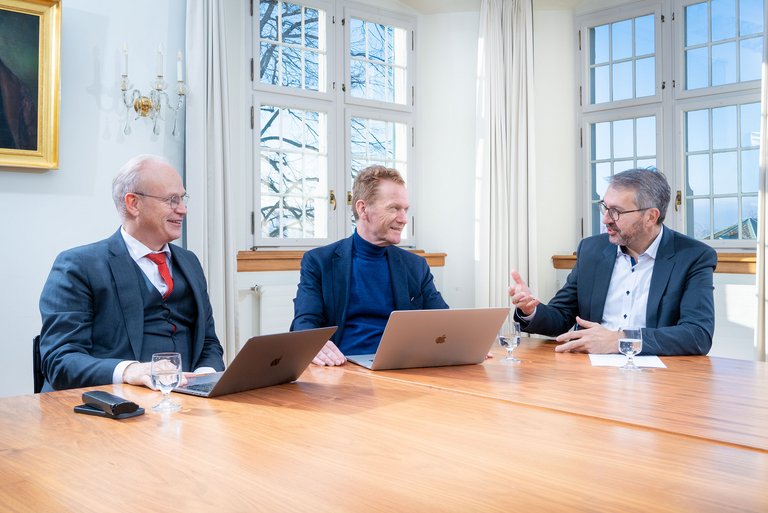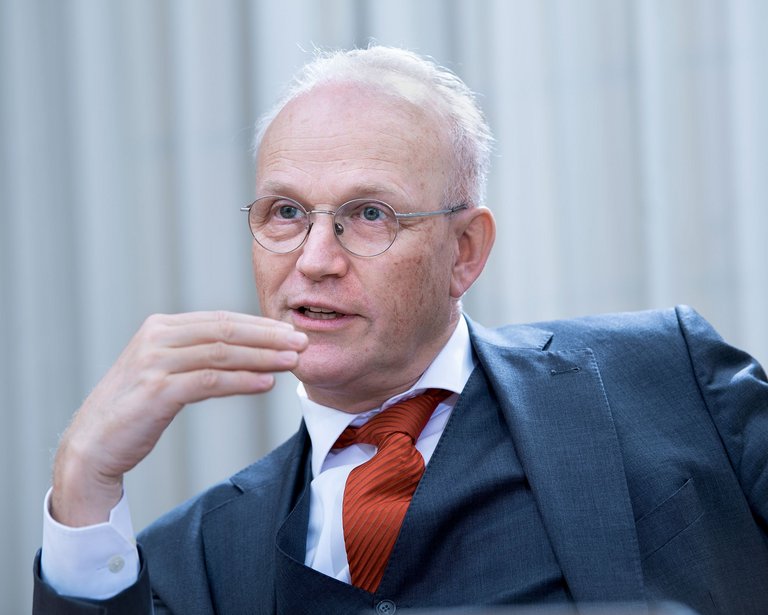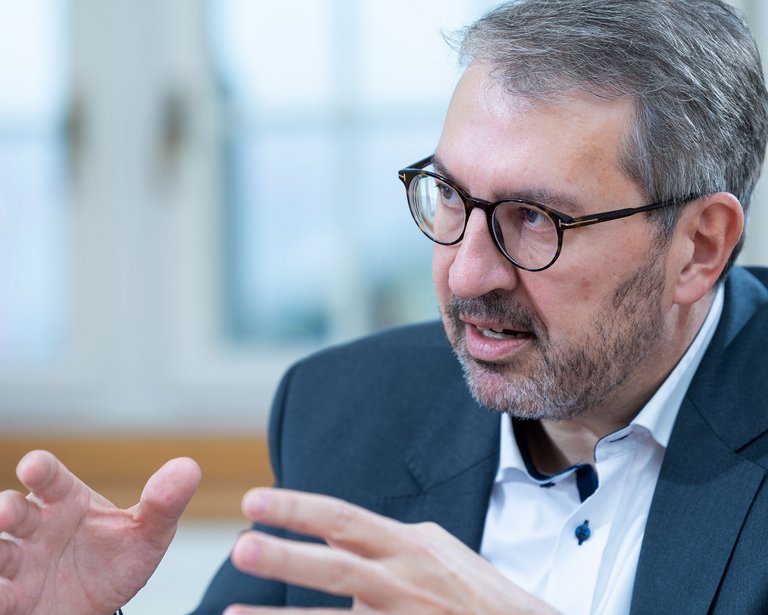Interview on Human Resources and Infrastructure
“A shared learning process”
UZH introduced a new working model and is promoting the leadership and management skills of its employees. In the following interview, Christian Schwarzenegger (Vice President Faculty Affairs and Scientific Information), Stefan Schnyder (former Vice President Finances and Human Resources) and François Chapuis (Vice President Real Estate and Facility Management) discuss the ongoing development of UZH’s work culture.
Christian Schwarzenegger, what makes a good work culture?
Christian Schwarzenegger: A good work culture is based on the knowledge, experience, mutual respect and social skills of all employees, as well as on good leadership and appropriate and attractive framework conditions that need to be adapted to changing needs from time to time. We see the development of the UZH work culture as an ongoing and shared learning process. The introduction of the new working model was one step in this process, with further steps to follow.
Stefan Schnyder, how will UZH go about developing its work culture?
Stefan Schnyder: The pandemic greatly accelerated many developments. This presents opportunities, but also the risk of overextending ourselves as an organization. We want to steer this momentum toward developments which can be maintained over the long-term and which we will keep reviewing with a critical lens every step of the way. This is why we carried out an employee survey on the topic of mobile working in the summer of 2022. We now know how our employees felt about mobile working at the time, and we will repeat the survey regularly in order to monitor and reflect on developments.
What conclusions do you draw from the results?
Schnyder: The survey results show how important it is to find a good balance between working on site and from home. UZH employees obviously appreciate the opportunity to work flexibly. Many would welcome a solution that goes even further, if compatible with operational requirements and line managers’ expectations. At the same time, however, the survey also clearly shows that physical presence is fundamental for a sense of belonging, and that employees feel more valued when they are on site. So it’s important to make sure we spend enough time on site – and to consciously dedicate at least some of that time to cultivating a spirit of cooperation and teamwork with our colleagues.
Schwarzenegger: According to the survey, the most important reason people give for working on site is the social interaction. We can communicate remotely with digital tools, but a true, vibrant sense of community only happens in person. For social interaction to take place at all, enough other people need to be around. The presence of others is vital for team cohesion, spontaneous conversations and an inspiring campus life. The 60-40 model encourages people to be present on site at the same time as their colleagues, thus meeting the human need for interaction.
According to the survey, leaders and managers are somewhat more skeptical about the new working model than other employees. Why?
Schnyder: For those in leadership roles, flexible working brings with it more responsibility. It is more complex and requires greater coordination to manage a team in which some members are in different locations some of the time than when all employees are in the same place all the time. If team members rarely see each other in person, line managers need to take specific compensatory measures to ensure a good team spirit is maintained. Finding the optimum combination of on-site and mobile work is not easy – but it is important that the right balance is struck for a flexible working model to be successful. Human Resources offers a consulting and coaching service to support leaders and managers in such situations.
Professors at UZH also have leadership responsibilities. What specific challenges do they face?
Schwarzenegger: Our professors reflect the full diversity of UZH. Preferences and challenges vary widely by discipline. In the natural sciences and medicine, the work of researchers and assistants is very different than in the arts and humanities, for example. Activities in the lab or clinic have very different rules and requirements than work in offices and libraries. We have therefore launched a pilot project in which interested professors from all faculties are developing ideas on how to combine a vibrant campus culture with digital technologies and mobile forms of work.
What does the pilot project involve exactly?
Schwarzenegger: The idea is to work together to find out which innovative forms of academic exchange are best suited for which type of work. The professors taking part in the pilot are being led by Jochen Menges, professor of human resource management and leadership at the Department of Business Administration. The aim is to promote direct exchange between professors, researchers and students, in particular, since we know that non-professorial academic staff and the students are very much interested in having a lively dialogue. In the end, we want the entire university to benefit from the experiences and insights on mobile working.
François Chapuis, what does the change in work culture mean for space requirements at the university?
François Chapuis: In the longer term, we need spaces that can be used in more diverse ways. The pandemic made us aware of this need. What makes on-site presence so important, and what we missed so much when working from home, is social interaction. This interaction is only possible in suitable spaces. On the other hand, in the survey many employees clearly expressed their need for places where they can concentrate and work in peace. We will take these needs into account when constructing and remodeling buildings as well as when organizing and furnishing them.
How do you think things will progress from here?
Chapuis: We are moving in the direction of greater differentiation of available spaces. Until now, we probably considered our own desks as our home base at work. In the future, we may also consider places in which we meet others and network as our home base. This idea is also evoked in the name of the planned FORUM UZH.
Does greater flexibility in the choice of work location mean that we pay more attention to how we work on site than we did before?
Chapuis: Many employees tell me that they now structure their time on site more consciously than before. I think that’s a positive development. Most employees’ time on site involves a variety of different forms of activity. Roughly speaking, there is a mix of concentrated individual work, collaborative work, routine tasks, confidential tasks, and breaks. Ideally, all UZH employees would be able to choose a suitable environment for each of the aforementioned categories of activity, e.g. disturbance-free areas for quiet work and more open areas for exchanging ideas with colleagues. In the long term, we plan to use this concept when planning new buildings or premises at UZH. This is already partially the case in the UZI 5 building, in the Functional Genomics Center and in Westpark. However, given the size and diversity of UZH, this process will take many years. We will proceed carefully and try to find the most suitable solution in each case in consultation with the employees concerned.
You have often described the development of the work culture at UZH as a shared learning process. What is the aim of this process?
Schwarzenegger: The aim is to have motivated and happy employees who can give their best and develop their skills at UZH.
Schnyder: Pleasant and modern working conditions are a prerequisite for this. Up-to-date technical infrastructure and modern workspaces in which the rich diversity of campus life can flourish are equally necessary. Last but not least, good leadership is needed at all levels so that staff feel appreciated, have a sense of connection with their teammates, and see perspectives for development.
How is UZH promoting the leadership and management skills of its staff?
Schwarzenegger: Over the past few years, UZH introduced a range of continuing education and advisory services aimed at line managers at all levels. These offers have proved very popular, for example the UZH Leadership Development Program, the Onboarding Day for newly appointed professors and the CAS program in Leadership and Governance at Higher Education Institutions. Another measure in developing UZH’s leadership and management culture was the introduction of the UZH Leadership and Governance Academy in 2022.
Which specific tasks does the UZH Leadership and Governance Academy cover?
Schwarzenegger: The academy pools and coordinates the continuing education programs and advisory services offered at UZH for line managers at universities. It enables participants to build networks and develop innovative ideas. For example, it has already initiated plans to set up a new training program for newly appointed professors. The academy is based on our strategic principles and follows the leadership and management principles currently in place at UZH. Thanks to its pooled expertise, the UZH Leadership and Governance Academy can contribute to a shared approach toward leadership at UZH that is geared toward the higher education sector.
How much consideration is given to leadership and management skills when appointing professors?
Schwarzenegger: Choosing who will be appointed to a professorial chair is one of the most significant and difficult decisions a university has to make. It is therefore our responsibility to select candidates that can live up to the various demands of their role. Specialist qualifications are still the key criteria, but we also consider interpersonal and leadership skills when appointing new professors. Most faculties have been conducting structured interviews on the topic of leadership for several years now, in addition to the actual appointment interviews.
In recent years, UZH reorganized and broadened the basis of leadership and management tasks as part of the Strengthening the Management of the University of Zurich and Governance 2020+ projects. How does promoting leadership and management skills fit into this development?
Schwarzenegger: They’re two sides of the same coin. Quality leadership includes good leadership structures as well as excellent leaders and managers. UZH expects a high degree of autonomy and individual responsibility from its members, and fostering and promoting leadership skills is therefore key. UZH is investing in its own longterm viability – by empowering its employees and professionalizing its leadership and management.
Survey on mobile working
The Future of Work @ UZH: Mobile Working survey was conducted in June and July 2022, independently of the broader UZH employee survey of May 2022. It was conducted by the UZH Center for Leadership in the Future of Work under the direction of Professor Jochen Menges.



